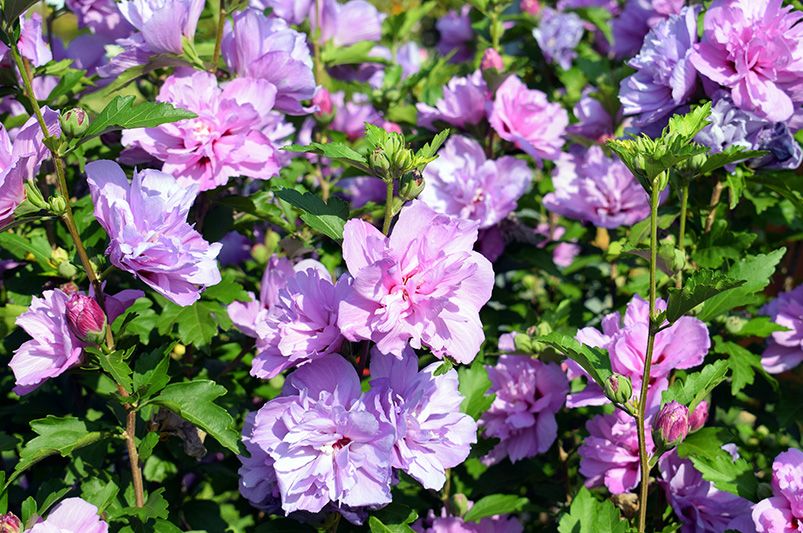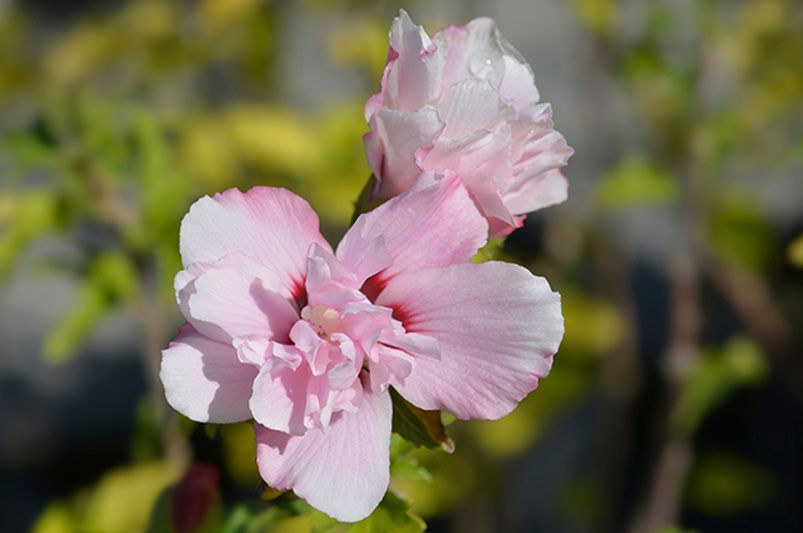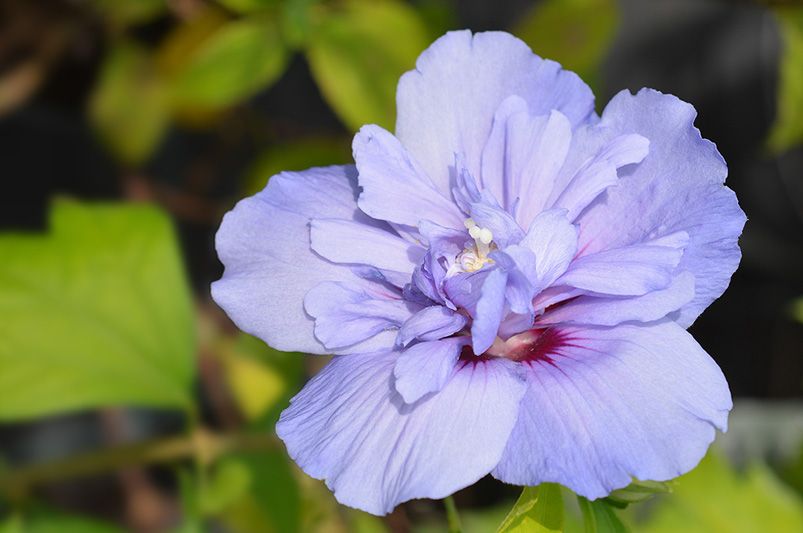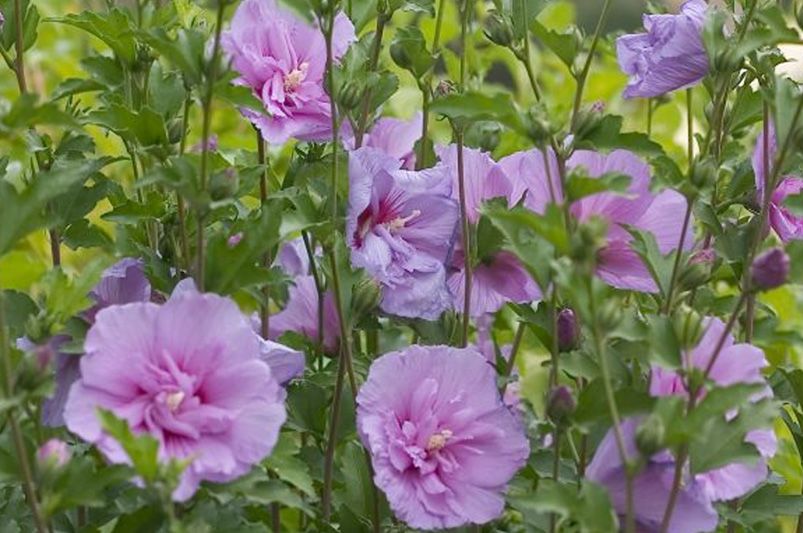
Dazzle Your Garden with These Jaw-Dropping Rose of Sharon Hibiscus Flowers
Published: 01/05/2024 | Updated: 21/06/2024
Rose of Sharon Hibiscus flowers have a reputation for their large, colorful blooms that can brighten up any garden. Belonging to the genus Hibiscus, there is an incredible diversity of the Rose of Sharon hibiscus to choose from, showcasing the wide range of this family. Vibrant reds, stunning pinks, tropical yellows - the possibilities are endless with these showy blossoms. The variety of hibiscus species available offers gardeners plenty of options for landscaping and cultivation, including those used for ornamental purposes and making tea. In this article, we will highlight a few of the most show-stopping hibiscus varieties that are sure to dazzle your garden. From intricate two-toned blooms to massive dinner plate-sized flowers, these hibiscus superstars are the cream of the crop. Read on to discover some exciting new show hibiscus plants to consider adding to your garden this year!



1. Ardens Rose of Sharon
The Ardens Rose of Sharon (Hibiscus syriacus ‘Ardens’) is a stunning deciduous shrub known for its lush, double lilac flowers that bloom from summer to early fall. By planting this variety in your garden, you can add height and color, as it grows robustly and you can plant it in spring or fall. To successfully plant hibiscus like the Ardens Rose of Sharon, consider starting with young plants from nurseries or rooting from cuttings. Thriving in well-drained, fertile soil, it prefers full sun to partial shade locations, reaching heights of 8-12 feet with a spread of 6-10 feet.
Plantation & Growth: The ideal soil conditions for Ardens Rose of Sharon include good drainage and high organic content. Additionally, it thrives in areas with ample sunlight and occasional shade, along with consistent watering during its growth period. It is known to thrive in regions classified as USDA zones 5-9.
Plant Care is straightforward for the Ardens Rose of Sharon. Watering should be consistent during the first growing season to establish a deep, extensive root system; thereafter, maintaining moderate moisture will suffice. This shrub benefits from annual fertilization each spring with a balanced slow-release fertilizer to promote healthy growth and blooms.
Pruning & Propagation: To maintain shape and encourage more vigorous blooming, gardeners should prune the Ardens Rose of Sharon in late winter or early spring. The Ardens Rose of Sharon responds well to pruning, which can also help control its size. Gardeners can accomplish propagation through cuttings or seeds, allowing them to expand their collection or share with friends.
Common Pests & Diseases: While resilient, it can occasionally fall prey to aphids and spider mites. Regular checks and prompt treatment can mitigate damage. Root rot can be a concern in poorly drained soils, reinforcing the need for site selection and preparation.
Variety Advantages: Unlike some of its relatives, the Ardens Rose of Sharon rarely produces edible fruits. However, its lack of seed production means less garden cleanup and no concerns about unwanted spread. This characteristic makes the Ardens Rose of Sharon a low-maintenance choice for gardeners seeking to add a splash of color without additional garden chores. When compared to rose mallow (Hibiscus moscheutos), known for its resistance to pests like Japanese beetles, the Ardens Rose of Sharon offers unique advantages in terms of bloom appearance and maintenance ease, making it an attractive alternative for those looking to diversify their garden with resilient and beautiful flowering shrubs.
Incorporating the Ardens Rose of Sharon into your landscape not only enriches your garden’s aesthetic but also invites a sense of peace and beauty, making it a rewarding addition for any gardening enthusiast.

2. Blue Chiffon Rose of Sharon
The Blue Chiffon Rose of Sharon (Hibiscus syriacus ‘Notwoodthree’) presents a unique visual appeal with its delicate, blue flowers stressed by a lacy center, reminiscent of a soft chiffon fabric. This variety thrives in USDA zones 5 through 9, making it a versatile addition to many gardens.
Plantation & Growth: The best time to plant the Blue Chiffon Rose of Sharon is in the spring or fall. It prefers a location that receives full to partial sunlight, where it can achieve its mature height of 8-12 feet with a similar spread. Offering adaptability to most soil types, it flourishes in well-drained, loamy soils.
Plant Care: Regular watering is crucial during its first growing season, easing into a less frequent schedule once established. It benefits from a balanced slow-release fertilizer. Apply it in the early spring to support its growth and floriferous nature.
Pruning & Propagation: Prune in late winter or early spring to encourage bushier growth and more profuse blooming. Propagation from cuttings is the most effective way to clone the desirable traits of this specific cultivar.
Common Pests & Diseases: Watch out for aphids and spider mites, two pests that occasionally trouble this plant. Proper cultural practices and pest controls usually keep these issues at bay. The plant is also resistant to many common diseases, including those that cause leaf spots and rots.
Variety Advantages: One of the standout features of the Blue Chiffon Rose of Sharon is its seedless nature, which prevents unwanted self-seeding in the garden. While it does not produce edible fruits, this characteristic simplifies maintenance and makes it an ideal choice for gardeners who appreciate lush, vibrant blooms without the hassle of constant cleanup.
Adding the Blue Chiffon Rose of Sharon to your garden not only introduces a splash of serene blue but also brings an air of sophistication with its intricate flower structure, offering long-lasting summer and fall interest.

3. Danica Rose of Sharon
The Danica Rose of Sharon (Hibiscus syriacus ‘Danica’) is a graceful deciduous shrub that enchants the eye with its dazzling white flowers with a flush of pink at the center. This charming variety is ideal for creating a focal point in the landscape or as part of a mixed border.
Plantation & Growth: The Danica Rose of Sharon flourishes when planted in the spring after the last frost, or in the fall, before the ground freezes. It is well-suited for USDA zones 5-8 and enjoys a sunny to partly shaded spot in the garden. A well-drained, fertile soil will allow it to achieve its full potential, growing up to 8 feet tall and 4 feet wide, thus providing a medium-sized hedge or standalone beauty.
Plant Care: Like other members of the Rose of Sharon family, the Danica variety requires regular watering in its first year, primarily if planted in areas with less natural rainfall. Once established, it is relatively drought tolerant. Feeding the shrub with a balanced fertilizer in early spring will encourage abundant blooms.
Pruning & Propagation: Pruning in late winter or early spring stimulates recent growth and allows for a more robust, blooming season. You can propagate Danica by taking semi-hardwood cuttings in the summer, ensuring identical copies of this desirable cultivar.
Common Pests & Diseases: The Danica Rose of Sharon is fairly resistant to pests and diseases, although it may occasionally attract Japanese beetles and whiteflies. Preventative measures and prompt treatment can manage these nuisances effectively.
Variety Advantages: A specific highlight of the Danica rose of Sharon is its lack of seeds, which translates to no messy fruits or unplanned seedlings spreading throughout the garden. This sterile characteristic makes it a favorite among gardeners who prioritize ease of care and cleanliness while still enjoying the ornamental splendor of flowering shrubs.
Integrating the Danica Rose of Sharon into your personal green space promises breathtaking white blooms and adds to the elegance of any garden without the extra labor typically associated with high-maintenance plants.

4. Lavender Chiffon Rose of Sharon
Step into a world of elegance with the Lavender Chiffon Rose of Sharon (Hibiscus syriacus ‘Lavender Chiffon’), a delightful shrub that graces many gardens with its soft, lavishly ruffled flowers and large, showy flowers. This perennial shrub is a must-have for those seeking both beauty and ease of care.
The Lavender Chiffon is suitable for planting in either spring or fall in USDA zones 5-9. It enjoys a sunny spot but can tolerate partial shade and prefers moist, well-drained soil. This variety grows to become a tall, upright shrub, typically achieving a height of 8-12 feet and a spread of 4-6 feet, making it perfect for use as an informal hedge or a garden accent.
Plant Care: To ensure a robust life, water the Lavender Chiffon regularly, particularly during dry spells. The application of a balanced fertilizer in early spring promotes healthier blooms. Once established, it shows good drought resistance, requiring less watering.
Pruning & Propagation: It’s important to prune in late winter or early spring before new growth starts. This rejuvenates the plant and encourages more significant flower production. Propagating it from cuttings is an easy way to ensure that the beauty of this specific cultivar endures season after season.
Common Pests & Diseases: This shrub is relatively disease free, though it can sometimes be susceptible to fungal leaf spots and blights. Proper care and attention can control pests like aphids and whiteflies, which can also find it attractive.
Variety Advantages: Many people especially appreciate Lavender Chiffon Rose of Sharon for its abundant and showy late-summer blooms when many other plants are no longer flowering. Its ability to adapt to various conditions and the low maintenance required makes it an alluring choice for both novice and experienced gardeners. Notably, this sterile variety does not produce seeds, preventing unwanted self-seeding and simplifying garden management.
Blooming Marvels: Let Hibiscus Flowers Light Up Your Garden with Unforgettable Color
As we’ve seen, there are so many stunning varieties of Rose of Sharon hibiscus that can add vibrant color and tropical flair to any garden. From the huge pink blooms of the Danica rose of Sharon to the unique striped flowers of Rainbow, these are some of the most eye-catching hibiscuses you can grow. The hibiscus flower, particularly the popular Rose of Sharon Hibiscus rosa-sinensis, exemplifies the beauty and diversity of the Rose of Sharon hibiscus plant with its large, striking, trumpet-shaped flowers. This perennial herbaceous plant is a testament to the hibiscus’s adaptability and ornamental value in garden design.
Hibiscus plants prefer well-draining soil, full sun, and a cozy fit when growing in containers, showcasing their versatility whether trained as a small tree, grown as a hedge, or kept as a container plant. The hibiscus tree, with its ability to thrive in full sun or partial shade, adds a unique touch to any garden, transforming any outdoor space into a tropical paradise.
If you’re looking to add a new focal point to your garden with big, beautiful blooms, consider planting one or more of these tropical hibiscus showstoppers this season. They will dazzle with their vibrant, colorful flowers and lush green leaves. Whether trained as a small tree, grown as a hedge, or kept as a container plant, these hibiscus varieties will transform any outdoor space into a tropical paradise.
Don’t miss out on growing some of these sensational hibiscuses for your landscape. With the proper care, you too can have a garden filled with the most dazzling hibiscus that will have your neighbors stopping to stare. Pick one or more of these 5 superstar varieties and get ready to showcase their gorgeous blooms this year! Visit ShrubHub Online today and order Your Hibiscus flowers today and Transform Your Garden into a Masterpiece.


